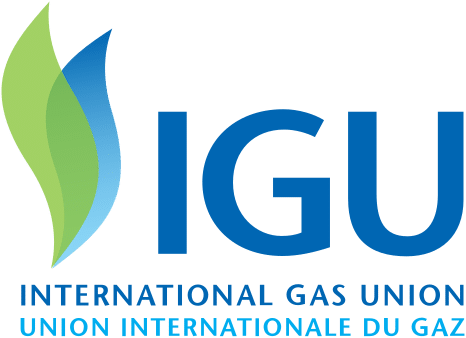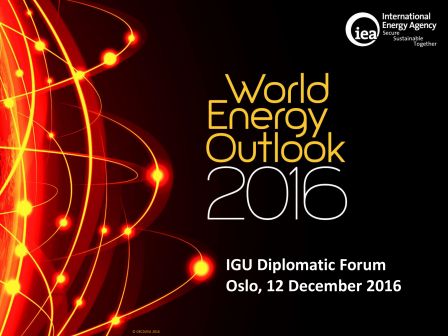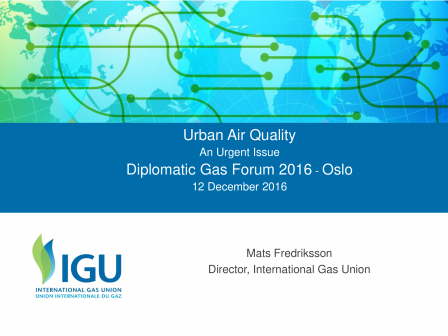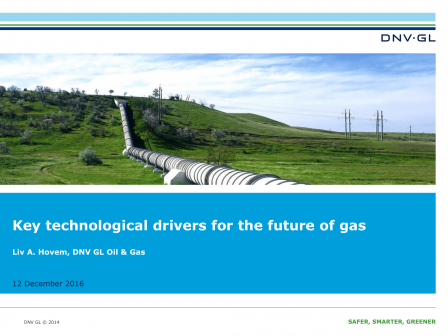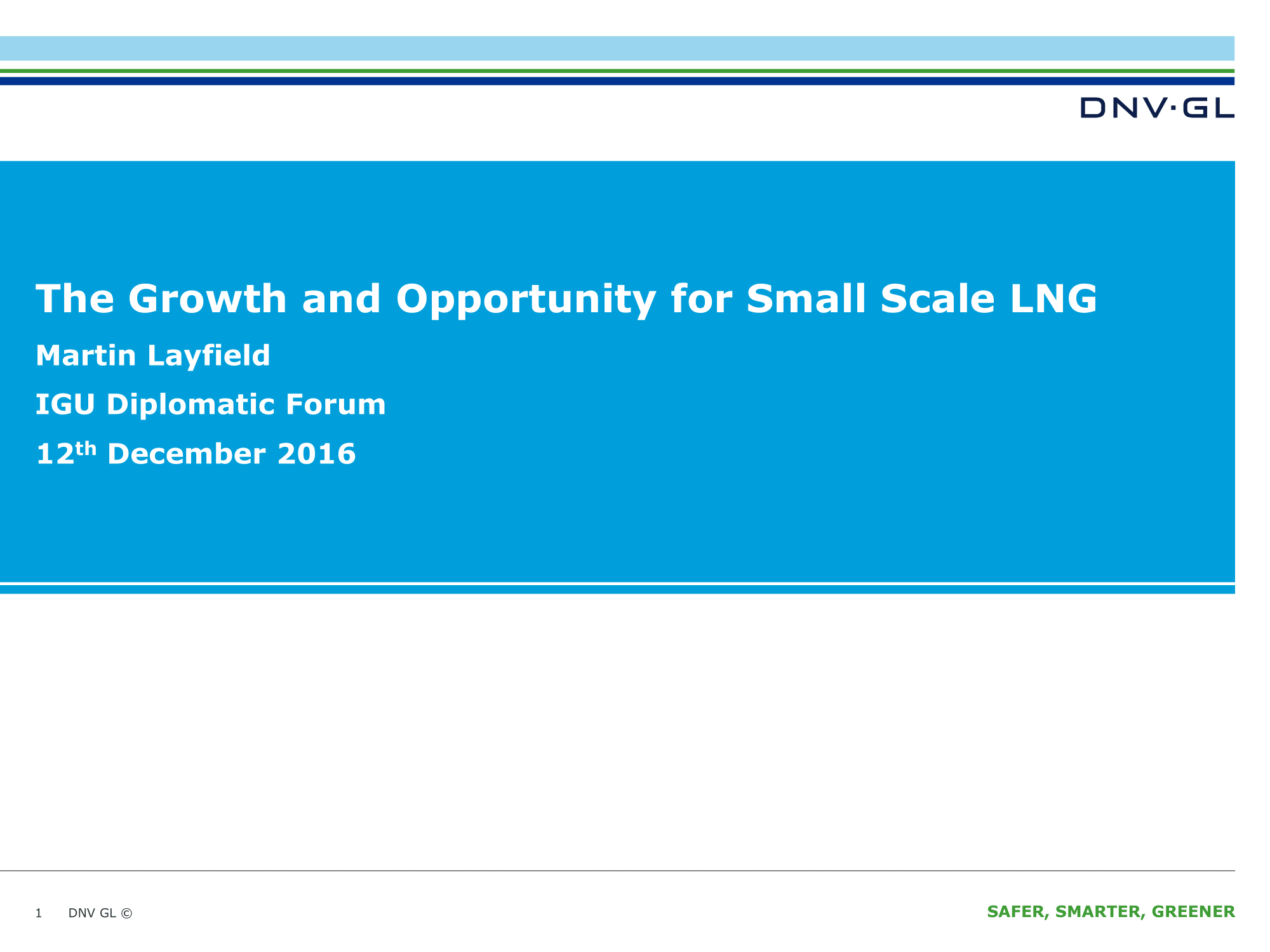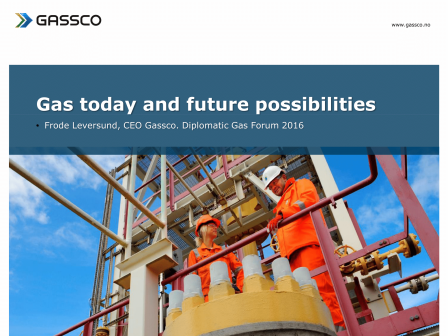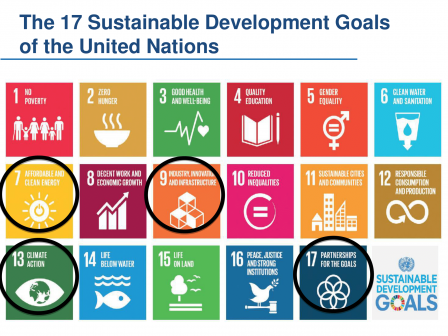The IGU Diplomatic Gas Forum has become a yearly event in Oslo, Norway. On 12 December, the 4th forum was organized at the headquarters of DNV GL in Norway. This was the third year DNV GL hosted the event.
The focus of the programme was “The energy transition and natural gas´s role in the sustainable energy future” and presentations were held by IEA, IGU, DNV GL and Gassco.
IGU Honorary Secretary General, Pål Rasmussen, welcomed the delegates setting the scene of the current, post COP 21 environment of the natural gas industry. He said the aim of this IGU Diplomatic Gas Forum would be to give an update on trends of the industry and on specific areas, providing fresh and updated information.
Opening – Remi Eriksen, DNV GL Group President & CEO
DNV GL Group President & CEO, Remi Eriksen, opened the Forum. In his speech he pointed to the Golden Age of Gas that was announced only a few years ago, but that already has evaporated. The COP 21 agreement has put even more pressure on hydrocarbons. Still natural gas has a role to play in the future, he said, especially in power generation. The potential is great for reduction of emissions, such as NOx, SOx, mercury, arsenic and similar. At the same time, there are challenges to overcome which cannot be forgotten. Fugitive methane emissions is one of them.
He characterized the relationship between gas and renewable energies as one of “friendemies”. They are excellent and natural partners, but at the same time competitors. In order for gas to contribute in the future, the industry must see natural gas as not only a commodity, but also a strategic resource that needs a strategic plan.
IEA World Energy Outlook 2016 – Markus Klingbeil, Senior Energy Analyst, IEA
[Download presentation]
Markus Klingbeil, Senior Energy Analyst at the International Energy Agency (IEA), presented the newly released 2016 edition of the IEA World Energy Outlook. He reminded the delegates that still 1.2 billion of the world´s population do not have access to electricity and 7 billion still lack access to clean cooking facilities. The access to affordable energy will create tension in the future, he said. Since 1990, the world has seen a 60% rise in world energy demand. This is expected to slow to 30% as energy efficiency becomes better. Gas takes off some of this increased demand mainly from transportation and industry, while coal and oil fall behind. Still, the clear winner in the next 25 years are the low-carbon technologies, supplying nearly half of the increase in energy demand to 2040.
Gas consumption will continue to increase, but IEA sees no easy ride for gas going forward. Competition is still strong from coal, but also renewables is squeezing gas in many markets. How things will evolve for gas will be decided in the years to come. The globalization of the LNG market can give a new gas revolution.
Have you read the IGU reaction to the IEA World Energy Outlook 2016? Look here.
Urban air quality – Mats Fredriksson, Former IGU Director
[Download presentation]
Mats Fredriksson, IGU Director under the Norwegian Secretariat, gave a presentation on the fresh edition of the IGU Case Studies in Improving Urban Air Quality report. Through the four cases studies of Berlin, Dublin, Krakow and Rotterdam, he provided empirical evidences on how natural gas significantly contributes to reduced emissions of GHG and air pollutants. The issue of urban air quality is an issue of life saving importance, he said, and these are real world solutions to real world problems.
Wish to read more? Download the report here.
Access also the press release on the report here.
Key technological drivers for the future of gas – Liv Hovem, Senior Vice President, DNV GL
[Download presentation]
Liv Hovem, Senior Vice President, DNV GL, talked on the key technological drivers for the future of gas. Although solar capacity has doubled over the last 15 years and wind capacity has four doubled within the same time, gas has a role to play also in a low carbon, resilient and sustainable energy future.
In order to properly discuss the future, there is a need for a total framework of the multi-functions of energy as a carrier, as a storage, but also as an energy source. DNV GL has just developed such energy system framework taking into account all functions.
Traditionally, the value chain has been horizontal from exploration to consumption, now the value chains are more interlinked. Technology innovation builds new value chains for different industries.
The Growth and Opportunity for Small Scale LNG – Martin Layfield, Global Gas Segment Director, DNV GL
[Download presentation]
Martin Layfield, Global Gas Segment Director, DNV GL, spoke of the growth and opportunity of small scale LNG.
According to him, the small scale market is developing quite well and has potential. It is flexible and although it has not developed as fast as expected by many, both policy and economics support growth in the sector going forward.
When moving from large scale storage to small chain value chains there are various possible ways. The picture is complex and there are many differences between countries.
In order to help developers and operators, DNV GL has launched a joint industry project that will develop decision support in the quest to develop small scale value chains. Alongside this initiative they have also recently launched the LNGi, an intelligence portal that tracks LNG infrastructure and fleet development globally.
Collaboration is very important to stimulate growth in market demand and infrastructure development, and equally important is intelligence in order to share global knowledge of infrastructure, markets and similar.
Gas today and future possibilities – Frode Leversund, Gassco CEO
[Download presentation]
Frode Leversund, CEO of Gassco, the Norwegian transmission company responsible for the transportation of Norwegian natural gas to the European market spoke of gas today and its future possibilities.
According to the IEA, Norwegian gas export volumes to Europe will stay more or less the same until 2040, and Frode Leversund presented how Gassco works together with regulators, government, operators, shipping and similar to ensure the continued supply of natural gas from the Norwegian continental shelf. There are many factors to take into account, such as investments, security of supply, environmental standards and continued robust facilities.
Closing – Torstein Indrebø, IGU Honorary Secretary General
[Download presentation]
The sum up and closing of the event was given by Torstein Indrebø, also IGU Honorary Secretary General. He summarized gas´ potential in the future sustainable energy mix through the points made by the five speakers. He also pointed to the UN Sustainable Development Goals and how natural gas can help meet several of these.
